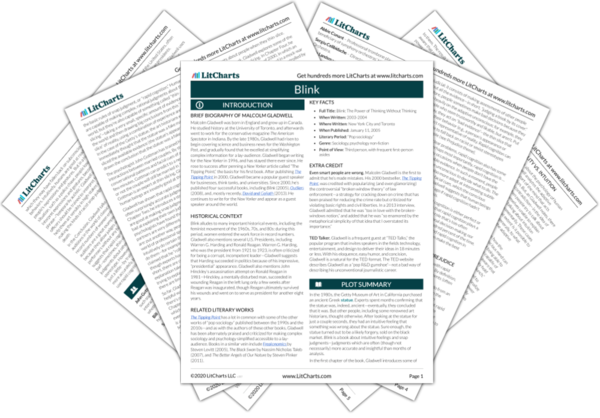Rapid Cognition, “Thin-slicing,” and the Adaptive Unconscious
At the heart of Blink is the concept of rapid cognition, or “thin-slicing,” the process by which people make quick assessments of the world using a limited amount of evidence. Sometimes, people base their decisions on thorough, deliberate, and rational choices—yet Gladwell shows that a staggering number of our decisions result from thin-slicing and instinctive hunches about how to act. This kind of decision-making process has some notable advantages, but also some clear problems.
In…
read analysis of Rapid Cognition, “Thin-slicing,” and the Adaptive UnconsciousRapid Cognition and Prejudice
One of the most evident problems with rapid cognition is that it can be prejudicial. By definition, rapid cognition involves making judgments (often about other people) in the absence of all the information—something we’re usually taught not to do from an early age. Furthermore, rapid cognition is prejudicial in the sense that, over a lifetime, the adaptive unconscious can “accumulate” stereotypes and bigotry, with the result that rapid cognition sometimes motivates bigoted behavior. But while…
read analysis of Rapid Cognition and PrejudiceRationality vs. Intuition
In order to talk about the psychology of human behavior, Gladwell analyzes the adaptive unconscious: the part of the mind that acts according to instinct and intuition. But, as Gladwell notes, there is a problem—and maybe even a contradiction—in the idea of analyzing intuition. Sometimes, when people try to talk about their snap judgments, they find themselves unable to explain them at all. In other cases, the act of talking about intuition causes people to…
read analysis of Rationality vs. Intuition
Free Will
One of Gladwell’s most challenging and provocative arguments concerns the role of free will in decision-making. Most people believe that human beings are free to choose what to do: they use their reason, experience, and emotion to reach a conscious choice. The only times when a human wouldn’t be acting freely would be if they were being physically forced or threatened, or if their mind were brainwashed. Blink challenges this common-sense belief by introducing the…
read analysis of Free Will






